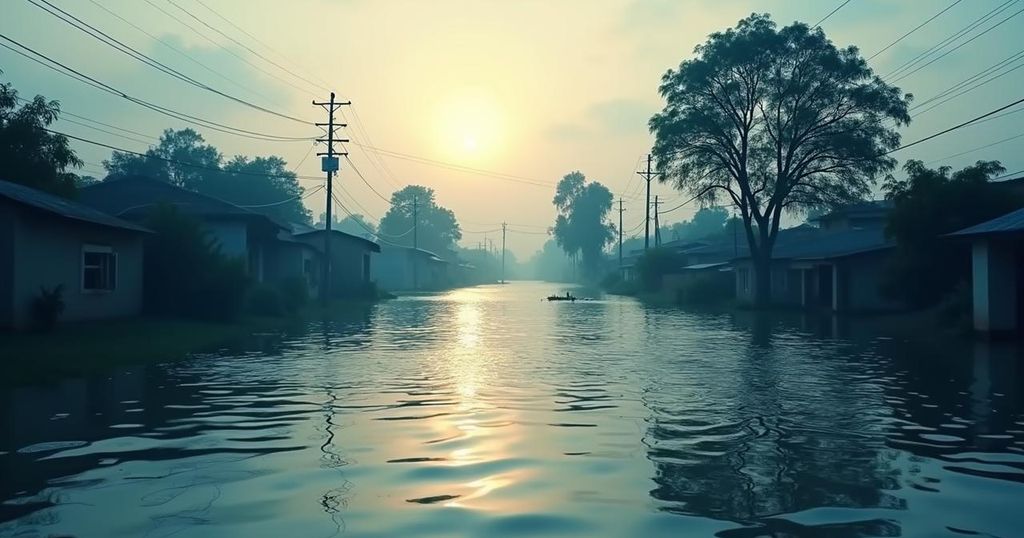One Million Affected as Severe Flooding Strikes Northeast Nigeria Due to Dam Collapse

Northeast Nigeria is grappling with severe flooding affecting one million people due to a dam collapse in Borno State. The flooding has destroyed many homes and worsened existing humanitarian challenges, with local authorities working to rescue and shelter the displaced. This incident compounds a decade-long crisis induced by Boko Haram insurgency, calling for urgent humanitarian response and disaster management measures.
Severe flooding in northeast Nigeria, triggered by the collapse of a dam, has left approximately one million individuals affected in Borno State. The disaster has destroyed thousands of homes, exacerbating an already critical humanitarian crisis in the region. Local authorities have been working diligently to rescue those displaced, providing temporary shelter as resources become increasingly strained due to the scale of the disaster. Reports indicate that heavy rainfall led to the overflow of the dam, which subsequently inundated numerous communities, including a state-owned zoo where wildlife escaped into local areas. Al Jazeera correspondent Ahmed Idris, covering the situation from Maiduguri, noted a continuous movement of residents fleeing inundated regions. Civilians have undertaken rescue efforts with limited diving equipment, facing the grim reality of discovering deceased individuals amidst the flooding. Remarkably, successful operations have rescued infants from the floodwaters despite the dire conditions. According to Borno State governor Babagana Zulum, this flooding has been described as the most severe in two decades. Although local officials have yet to confirm fatalities, the situation remains precarious. The Vice President of Nigeria, Kashim Shettima, visited the affected populace, pledging to deliver essential supplies such as food, temporary shelter, and medical assistance. However, reports from Idris suggested that relief efforts were slow to materialize, with minimal supplies reaching those in need. Zulum highlighted the extent of the flooding, noting that a significant portion of Maiduguri had experienced overwhelming water levels, raising concerns over potential waterborne diseases due to flooded sewer systems. This disaster further complicates an ongoing humanitarian crisis in a region that has endured a decade-long insurgency by Boko Haram, which has taken the lives of over 35,000 individuals and displaced 2.6 million more. The National Emergency Management Agency has reported that the floods have claimed 229 lives across Nigeria since the beginning of the year, illustrating the urgent need for comprehensive disaster management strategies to mitigate such occurrences in the future.
The recent dam collapse and subsequent flooding in Borno State highlight the vulnerability of northeast Nigeria to natural disasters. This region has already been severely affected by a long-standing insurgency led by Boko Haram, which has decimated local populations and displaced millions over the past decade. The intersection of these crises exacerbates the humanitarian conditions, leading to increased challenges in disaster response and recovery for the affected individuals and communities. This flooding is particularly concerning given the previous history of severe flooding incidents, which have resulted in significant casualties and displacement in previous years, emphasizing the need for strategic interventions to protect vulnerable populations.
In summary, the catastrophic flooding in Borno State, Nigeria, following the dam’s collapse, has resulted in substantial humanitarian challenges for approximately one million affected individuals. With authorities scrambling to provide necessary rescue operations and support, the situation remains dire as relief efforts struggle to keep pace. This incident not only signifies the urgent need for improved disaster management but also underscores the ongoing humanitarian crises facing the region due to the Boko Haram insurgency. Continued vigilance and strategic aid are essential to alleviate the risks faced by the vulnerable populations in northeastern Nigeria.
Original Source: www.aljazeera.com







